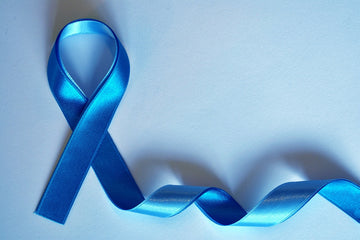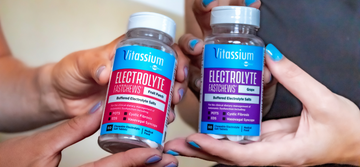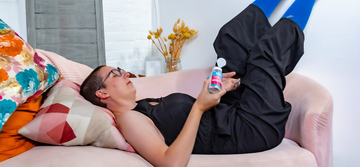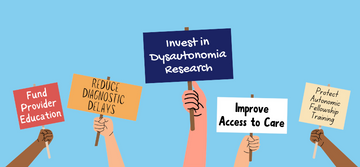
Did you know that Postural Orthostatic Tachycardia Syndrome (POTS) is just one of at least 15 types of dysautonomia? Although POTS isn’t a rare condition, some other types of dysautonomia, like Familial Dysautonomia, are. In honor of Rare Disease Month and Jewish Disability Awareness and Inclusion Month, the team at Vitassium would like to help raise awareness of Familial Dysautonomia and the Familial Dysautonomia Foundation.
What is Familial Dysautonomia?
Familial Dysautonomia is a rare genetic condition that affects the autonomic and sensory nervous systems. It affects all involuntary bodily functions such as breathing, swallowing, blood pressure regulation, temperature control, muscle control, producing tears, and balance. Some people with FD also experience uncontrollable vomiting attacks, known as autonomic crises.
FD is degenerative, meaning symptoms begin in infancy and increase and worsen as one ages. It often results in scoliosis, kidney and heart problems, frequent lung infections, severely impaired vision, and learning difficulties.
Who can get Familial Dysautonomia?
Familial Dysautonomia is extremely rare — fewer than 800 people have ever been diagnosed with it and fewer than 350 people worldwide are currently known to be living with it, most of whom are of Ashkenazi Jewish descent.
What causes Familial Dysautonomia?
Familial Dysautonomia occurs when both parents carry a mutation in the ELP1 gene, which is responsible for creating a protein that helps the nervous system develop. Up to 1 in 19 people with Ashkenazi Jewish heritage are carriers.
In 2001, the Familial Dysautonomia Foundation funded research that discovered the gene that causes FD, which led to the development of genetic testing for FD and allowed families carrying the gene mutation to have healthy babies.
How is Familial Dysautonomia treated?
Unfortunately, Familial Dysautonomia is a life-threatening disease with no cure. Treatments currently focus on managing symptoms and slowing disease progression. However, research funded by the FD Foundation and care provided by the Dysautonomia Center at NYU Langone offers hope that more effective treatments and even a cure will be found. Although people with FD once had a 50% chance of living to 5 years old, they now have a 75% chance of living to 40 years old. There is also hope that cures for FD will also be effective in other conditions like Alzheimer’s, Parkinson’s, ALS, and MS.
About the Familial Dysautonomia Foundation
The Familial Dysautonomia Foundation was founded in 1951 by parents of children with FD. Vitassium recently spoke with Lanie Etkind, Executive Director of the FD Foundation, on how the Foundation helps people with FD. She said:
- Most of the funds we raise throughout the year help support the Dysautonomia Center at NYU Langone, the world’s premier center for the treatment of and clinical research on FD. The Foundation was instrumental in establishing this Center more than 50 years ago, and we have continued to be its primary funder. We have a very close and collaborative relationship with the medical team there.
- The Foundation’s Scientific Advisory Board brings together scientists, researchers, medical doctors, and professionals from the pharmaceutical industry to encourage, support, and coordinate FD research worldwide.
- The Foundation organizes FD Day, a virtual, interactive day of learning and community building for patients, families, and others, featuring presentations by FD clinical providers and scientists on the latest advances in FD medical care and research that also spotlights talents and achievements of people with FD.
- The Foundation lends oxygen concentrators, needed by people with FD for air travel, free of charge.
- The Foundation supports programs that enhance quality of life for people with FD, including virtual mental health counseling, facilitated virtual “hang out” groups, and monthly virtual social activities.
- The Foundation provides information to the FD community and promotes FD awareness to the general community through e-blasts, a website, and a twice-yearly newsletter.
To learn more about Familial Dysautonomia or how you can help, visit the Familial Dysautonomia Foundation or the Dysautonomia Center at NYU Langone.







